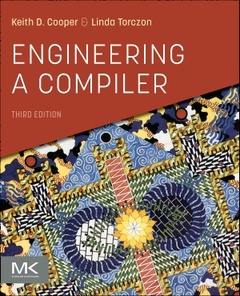Description
Engineering a Compiler (3rd Ed.)
Authors: Cooper Keith D., Torczon Linda
Language: English
Subjects for Engineering a Compiler:
Keywords
Nondeterministic Finite Automata; Thompson’s Construction; Hopcroft’s Algorithm; Brzozowski’s Algorithm; Top-Down Parsing; Recursive-Descent Parsers; Unary Operators; Context-Sensitive Ambiguity; Type Systems; Attribute-Grammar Framework; Circularity; Syntax-Directed Translation; Stack-Machine Code; Symbol Tables; Object-Oriented Languages; Boolean Operators; Iterative Dominance Framework; Code Motion; Leaf Call Optimization; Peephole Optimization; List Scheduling Algorithm; Software Pipelining; Control-Flow Operations
105.94 €
In Print (Delivery period: 14 days).
Add to cart848 p. · 19x23.4 cm · Paperback
Description
/li>Contents
/li>Biography
/li>Comment
/li>
1. Overview of Compilation 2. Scanners 3. Parsers 4. Intermediate Representations 5. Syntax-Driven Translation 6. Implementing Procedures 7. Code Shape 8. Introduction to Optimization 9. Data-Flow Analysis 10. Scalar Optimization 11. Instruction Selection 12. Instruction Scheduling 13. Register Allocation 14. Runtime Optimization
Linda Torczon is a principal investigator on the Massively Scalar Compiler Project at Rice University, and the Grid Application Development Software Project sponsored by the next Generation Software program of the National Science Foundation. She also serves as the executive director of HiPerSoft and of the Los Alamos Computer Science Institute. Her research interests include code generation, interprocedural dataflow analysis and optimization, and programming environments.
- Presents in-depth treatments of algorithms and techniques used in the front end of a modern compiler
- Pays particular attention to code optimization and code generation, both primary areas of recent research and development
- Focuses on how compilers (and interpreters) implement abstraction, tying the underlying knowledge to students’ own experience and to the languages in which they have been taught to program
- Covers bottom-up methods of register allocation at the local scope




